
- 0.50% APY on checking balance
- Up to 3.30% APY on savings
- $0 account or overdraft fees
- Earn $50 or $300 when you sign up and set up eligible direct deposit
Whether you’re dancing in Hvar Town or walking through the city streets of Zagreb, you’ll be spending in kuna, the national currency. The exchange rate for the kuna is fixed to the euro, allowing the government to make kuna more expensive during the summer tourist season. In Croatia, you’ll want to bring both a card and cash. Major stores, hotels, restaurants and bus or train fares can be paid with plastic. Go with a travel credit card to avoid hefty foreign transaction fees.
However, if you book local accommodations, shop local or wander onto the islands, you’ll want some kuna with you. ATMs are widely available all over the country, except on the most remote islands. All you need is a debit card with a chip and a four-digit PIN number.



You shouldn’t have any trouble using your Visa or Mastercard in Croatia. American Express is also accepted, just in fewer places. To help avoid extra bank fees in Croatia, use a variety of cards and use each one for a specific purpose. Try to use a card that doesn’t charge a currency conversion fee and another that has no fee for ATM withdrawals — even better if you can find a card that has both features.
There are debit cards and credit cards that waive both currency conversion and international ATM fees. Having a combination keeps you covered if you need credit or cash when you need it. Make the most of your trip in Croatia and organize your finances before you go. Compare the travel money products available to you to decide on the best way to take and spend money in Croatia.
The best way to spend in Croatia is to use a card with low or no currency conversion fees and no foreign ATM transaction fees — this allows you to withdraw, spend and use kuna.
There are a handful of travel credit cards that let you spend in another currency without paying the extra 3% foreign transaction fee. The Capital One VentureOne Rewards Credit Card for example waives foreign transaction fees entirely, helping you spend more of your trip reserves on local cafes or boardwalking around the captivating watery greenery in Plitvice Lakes National Park (). Carrying a credit card can also give you the added benefit of travel insurance and discounts, depending on your provider.
For added savings, take advantage of the interest-free period by paying your balance in full each month. Watch out for cash advance fees and extra charges if you make a withdrawal on credit — it’s one of the most expensive ways to get cash.
Visa and Mastercard are widely accepted across Croatia, as are Diners Club and American Express at fewer stores and hotels.
In addition to prime spots at airports, ATMs in Croatian cities and towns are easy to find in banks and supermarkets.
| Merchant acceptance | ATM acceptance | |
|---|---|---|
Visa | ||
Mastercard | ||
American Express | ||
Discover |
Whether you incur any fees on your credit card purchases in Croatia largely depends on your credit card. You could pay:
Yes. Easily avoid this with a travel card. Travel cards typically have no foreign transaction fees. As for DCC, decline if offered to pay in US dollars.
Explore top debit cards with no foreign transaction fees and travel credit cards by using the tabs to narrow down your options. Select Compare for up to four products to see their benefits side by side.
We currently don't have that product, but here are others to consider:
How we picked theseThe Finder Score crunches over 300 checking accounts from hundreds of financial institutions. It takes into account the product's monthly fees, overdraft fees, opening deposit, customer support options, ATM network and features — this gives you a simple score out of 10.
To provide a Score, Finder’s banking experts analyze hundreds of checking accounts against what we consider is the best option: no monthly fees, no overdraft fees, a large ATM network of 50,000 or more, additional features outside of typical banking services, and the optional perk of earning interest. Accounts that are nearly free to maintain and use are scored the highest, while accounts with costly fees and few features are scored the lowest.
The Finder Score is a simple score out of 10. The higher a savings account's score, the better we think it is for the average customer.
We score each credit card in our database of hundreds based on a data-driven methodology with 3 main criteria: Does the card offer rewards? Does the card have an annual fee? What's the card APR%?
Banks that waive foreign ATM fees and currency conversion fees will save you the most on your trip to Croatia. You’ll find plenty of ATMs in Croatia, but you’ll be charged a user fee from the Croatian banks. However, you can get reimbursed foreign transaction fees and ATM operator fees by using a Betterment Checking as your go-to travel debit card.
There are no travel cards on the market which allow you to load, withdraw or spend kuna. So even if your travel card is loaded with a major international currency, currency conversion fees still apply (there are a few travel cards that don’t charge for currency conversion).

Travelers to Croatia need to be prepared to spend the kuna. Even though euros are widely accepted, using euros rather than kuna will almost certainly leave you short-changed. Use kuna either by exchanging foreign currency, withdrawing from an ATM or using credit or debit cards to make purchases.
If you’re concerned about exchanging money overseas, check out the option of sending cash to Croatia before your trip with an international money transfer service.
Tips:
Don’t concern yourself with traveler’s checks — it is more hassle than it’s worth. Card payments are the norm in Croatia, and card providers offer money-back guarantees if you’re the victim of fraud.
Over the past 12 months, $1 will get you about 7HRK. While it’s extremely difficult to predict where forex rates will move in the future, over the past couple of years, changes in value between the two currencies will have had little or no significance for Americans visiting Croatia.
Live Rate
Refreshing in: 60s | Sat, Feb 07, 01:17PM GMT
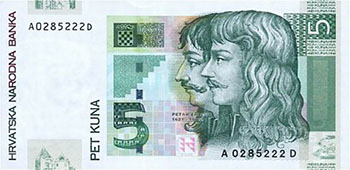 | 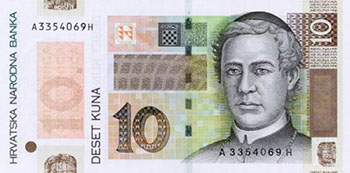 | 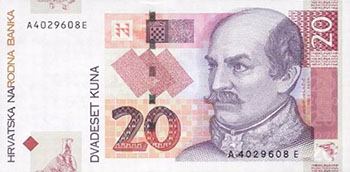 |
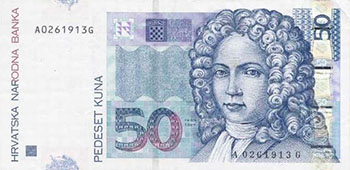 | 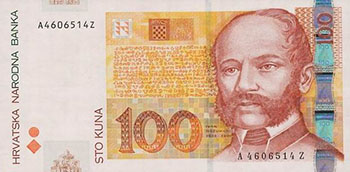 |
ATMs called Bankomats are easily found all over Croatia. When withdrawing a large sum of money, you may get stuck with large bills. The 500 kuna and even rarer 1,000 kuna will be tricky to change, especially from smaller shops. Try getting larger notes changed at a post office or in the bank of the ATM you used to make the withdrawal.
You won’t have a problem finding ATMs that accept Visa and Mastercard, and American Express is fairly common too. Plus, keep more of your dollars to use around the country by going with a Betterment Checking debit card. This account reimburses all ATM fees within 24 hours of submitting, including for international ATMs.
During the summer season, along the coastal stretch, prices are much higher than the rest of the year. This can’t really be avoided, but if you are on a tight budget, you can scrape by staying in hostels and cheap hotels. On the other hand, if you have money to spend, Croatia is an excellent place to let loose and live a glamorous life, even for just a week. All prices are in US dollars.
| Basic costs | Mid-range | A luxury experience | |
|---|---|---|---|
| Accommodation | One night Dorm: $25 Campsite: $6 | Hotel $95 per person | 4-star hotel Double $135 |
| Meals | Basic meal at a small restaurant $8 | Meal at a mid-range restaurant $15 | Fine dining $45 per person |
| Activities | Walk around the city Free | A local city bike tour $25 per person | Private sailing trip $160 per person |
Prices are approximate and are subject to change.
What do you think is the best way to take money to Croatia?
Phil says a debit card and a credit card combination are a good way to fund your vacation. He didn’t bother applying for a travel card because he says they’re pretty useless to use in Croatia.
Croatia is a safe country for travelers, and tourists can exercise their usual precautions. The biggest threat is petty crime, such as bag-snatching and pickpocketing.
Avoid flashing signs of wealth, keep valuables at home and stay aware of your surroundings at all times. Consider keeping your wallet concealed in your pocket or using a money belt to keep your funds out of arm’s reach.
Croatia offers travelers a chance to look into history. From the seaside castle walls of Dubrovnik — or the site of Kings Landing in Game of Thrones — to the old-world charm of Zagreb, Croatia has many sights for tourists to see.
However, just like traveling anywhere, Croatia presents a unique set of risks, which is why every traveler needs travel insurance. Travel insurance for Croatia covers:
How to pay, how much to bring and travel money suggestions for your trip to USA.
How to pay, how much to bring and travel money suggestions for your trip to New Zealand.
How to pay, how much to bring and travel money suggestions for your trip to Thailand.
How to pay, how much to bring and travel money suggestions for your trip to Vietnam.
How to pay, how much to bring and travel money suggestions for your trip to Mexico.
How to pay, how much to bring and travel money suggestions for your trip to Portugal.
How to pay, how much to bring and travel money suggestions for your trip to Germany.
How to pay, how much to bring and travel money suggestions for your trip to Ecuador.
How to pay, how much to bring and travel money suggestions for your trip to Canada.
How to pay, how much to bring and travel money suggestions for your trip to Japan.